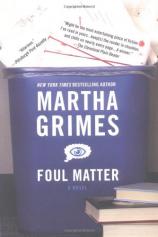Interview: September 5, 2003
September 5, 2003
Martha Grimes' succession of novels has demonstrated time and again her mastery of prose and her limitless imagination. In her latest offering, FOUL MATTER, Grimes' expands into virgin territory with a satirical tale of writers and publishers and the comic consequences when egos and ethics collide. In this interview with Bookreporter.com's Ann Bruns, Ms. Grimes gives readers a glimpse into her views on the industry and her sense of what it means to be a true writer.
Q: FOUL MATTER is a wonderfully funny tale built upon the vanities and vices that drive the world of publishing. Is this a book that you've been itching to write for a long time?
MG: Actually, I wrote FOUL MATTER over a period of five or six years. The book was a kind of safety valve. Whenever I'd get fed up with Richard Jury or one of the other books I was writing, I'd just go back and write another chapter of FOUL MATTER. I loved writing this book. It was inspired --- just as Paul Giverney's book was inspired --- by an officious little note from the publisher's assistant returning my original manuscript. I couldn't believe anyone could use this phrase without laughing fit-to-kill.
Q: Do you think the average reader, with limited knowledge of the publishing game, will grasp all the marvelous satire within the storyline?
MG: Yes, I think so. After all, it's a pretty simple-minded business. Well, come to think of it, it could be any business, couldn't it?
Q: The contract demands of best-selling author Paul Giverney set the wild events of FOUL MATTER in motion and, as the story unfolds, readers are treated to several views of the events in alternating narrations. Does this style of multi-voice narration make a storyline easier or more difficult for you to write?
MG: The question is more intelligent than the execution of the book. It didn't consciously occur to me --- well, no, I take that back. The part called "Jardine les Plantes" is, actually, quite intricately done but I doubt anyone will notice. It is, as you say, "multi-voiced" and I did a chart: a large square (Ned and Nathalie in the actual garden) and then progressively smaller squares, each about a character's involvement with flowers (e.g., Sally and the blue bouquet; Candy, Karl and the zinnia bed). I honestly don't know if this is easier or more difficult.
Q: Clive Esterhaus is the essence of the ambitious corporate climber. Yet despite his self-serving actions, he surmises that the publishing industry is in danger of imploding from huge author advances. How close are his reflections to the truth?
MG: Imploding from huge advances? Oh, this is very, very, close to the truth.
Q: Saul is a writer loaded with imagination but reluctant to spend it. Despite his status as the revered elder of the group, he hasn't submitted a manuscript in 10 years. Have the previous literary accolades created a fear of failure and undermined his confidence? Or does he simply reveal in the process too much to "put a period," as Jamie advises.
MG: Saul does, of course, suffer as all writers do at times from a lack of confidence, but I don't think it has much to do with accolades or his reputation. The reason he gets blocked is because he honestly didn't realize the book ended when it ended. That is too simple a reason, though; Saul perhaps should have gotten more extensive treatment than he did. But, hey, like I said. This is a simple-minded business.
Q: Ned is so tortured over his current manuscript and the fate of his heroine, he is totally unaware of the danger unfolding around him. His stream of consciousness intertwines imagination with reality to the point that he's a participant in his own fiction. Is this a common occurrence for writers during the creative process?
MG: I'm sure there are a lot of writers out there who would answer this question, "Oh, my goodness, yes. Yes, I get as involved as Ned with my characters, blah blah blah." I seriously doubt it. God knows I wish I got this involved; I wish I were Ned. The initial motivation in writing this book was to find out what sort of person I believed to be a pure writer, the "ideal writer". Ned comes very close to it. But I think he needs a shot of Jamie's pragmatism (though Jamie is, of course, handing everybody a line). Maybe the ideal writer is someone like Jimmy McKinney, who can spot the heat around the corner and get the hell out of his destructive life and do what he knows he's meant to do.
Q: In previous interviews you've elaborated on the elusive girl who makes frequent appearances in your novels. Nathalie would certainly seem to be another instance. Do you find that your other characters hover around the periphery of your consciousness regardless of what book you're writing?
MG: That's very interesting. I hadn't thought of Nathalie as another representation of the Girl. No, I don't think other characters come knocking on the door. I can write a couple of books at once and they all seem to know their place.
Q: Hit men have become increasingly popular personas in both literature and film. Was the delightful duo of Karl and Candy fully formed in your mind from the beginning or did their personalities gradually evolve in reaction to the other characters and events?
MG: Karl and Candy were there from the beginning. I don't think K and C have much to do with evolution. I liked them right away. I think I had that scene in Bobby's office almost from the beginning. It's one of my favorite scenes.
Q: The hilarious convergence of characters in the town of Pittsburgh was reminiscent of a Blake Edwards' movie --- (Shot in the Dark comes to mind) --- and readers are bound to be laughing out loud at this point. Did you start out with the idea for all the players to cross paths in Pittsburgh or were you just setting the stage for later revelations about Ned's enigmatic past?
MG: . . .and so is Pittsburgh. That whole business had me rolling on the floor; I loved it. But Pittsburgh didn't come up until later on. I wasn't really thinking about Ned's past except when I heard about that I.S.A.L.Y. acronym, I knew that was going to figure into things. (I didn't see Shot in the Dark; was that a Peter Sellers thing?)
Q: The Old Hotel dining area presented the perfect backdrop to illuminate the comic posturing and rivalries of authors and publishers alike. In reality, to succeed as an author, don't you have to have at least a minimal amount of ego?
MG: To succeed as a writer, you probably have to have a fair amount of ego, although in the case of this "ego" I think it's just an incredible amount of determination. Instead of "Aren't I grand?" it's more "I don't care if I'm grand, but I'm doing this anyway."
Q: In the beginning of FOUL MATTER Paul Giverney reflects on the scarcity of "pure writers." Do the commercial lures corrupt the purist, or is it simply a rare quality that few writers have to begin with?
MG: It's both. But I think it's more a writer's confusion as to what a writer is supposed to be rather than merely a gimmee gimmee money, publicity, fame, etc. Ned is a purist; he doesn't get caught up in the whole publishing process, and this is very, very rare. Jimmy McKinny knows this; he knows that underneath all of the tinsel and glory, a writer can still stay in touch with the blank page.
Q: If the purist is primarily concerned with the internal process of writing rather than the external process of getting published, then how would they realize any satisfaction from putting their thoughts to paper? In other words, if the tree falls in the forest and no one hears it...
MG: If the tree were a writer, then someone would hear it. I do not regard myself as this rare kind of tree. But J.D. Salinger still writes, doesn't he?
Q: Do you think most best-selling genre authors are content with their commercial success, or do they secretly yearn for literary awards and accolades?
MG: Well, I certainly yearn for literary awards and accolades. I don't know about Sue Grafton. I think Wallace Stegner said the difference between genre writing and "literary" writing is that one is craft, the other art. The blueprint is already there for the writer of mysteries (no matter how he may deny it). For the literary writer, there is no blueprint. He's taking much more of a chance. I agree with this.
Q: In FOUL MATTER Jamie is the prolific genre writer, criticized by her peers for accepting the limitations that places on her talent. Knowing your distaste for genre labels, do you feel eliminating them would awaken the literary juices of more writers and substantially weed out the field? Is doing away with genres even feasible in today's commercial market?
MG: No. Eliminating genres would eliminate a lot of writers. The reading public likes a mystery series because it means settling down with something familiar, with characters who are "like family," and who can blame them? We all like the familiar. The Richard Jury series might be analogous to Cracker Barrel Restaurants (except one's British, one's American). I like Cracker Barrel Restaurants. I know I will be able to get oatmeal there at noon. It makes my stomach comfortable.
Q: Although your writing always contains humor, FOUL MATTER is somewhat of a departure from your other novels. Can we look forward to more books along the same lines in the future?
MG: Yes, FOUL MATTER is a departure. The couple of books I have in mind right now are in the other two series --- good lord! Everything turns into a series! There's Emma and there's the animal welfare series. But I wouldn't be surprised if something else turns up more on the order of FOUL MATTER. I certainly hope something does which I can have as much straight fun writing as I did this book.




